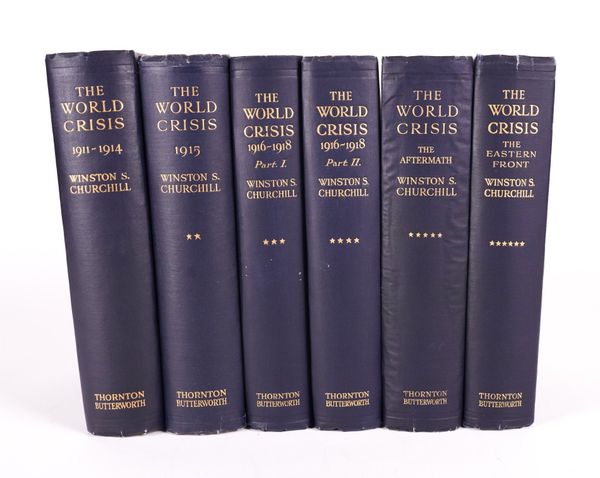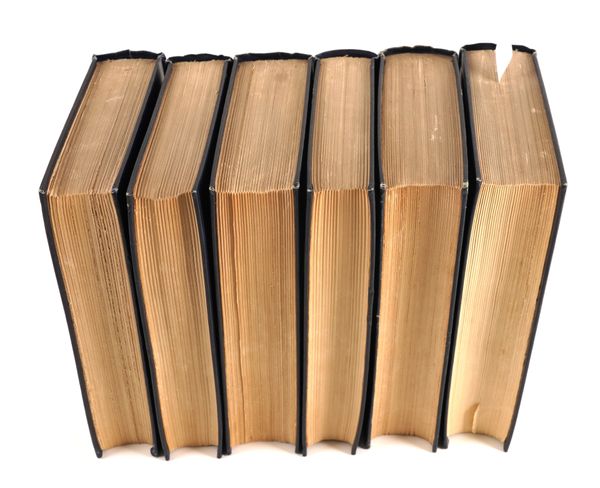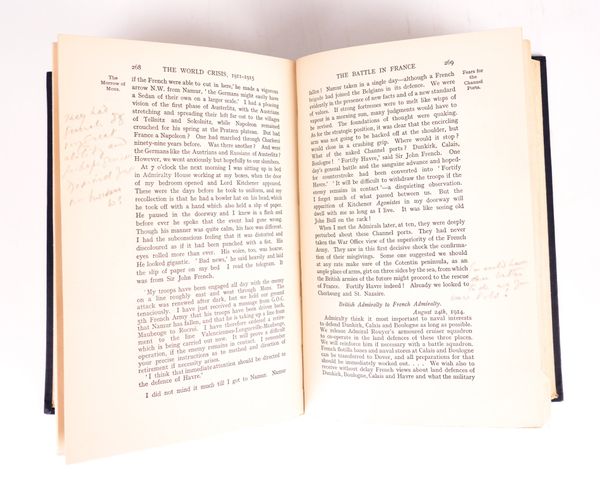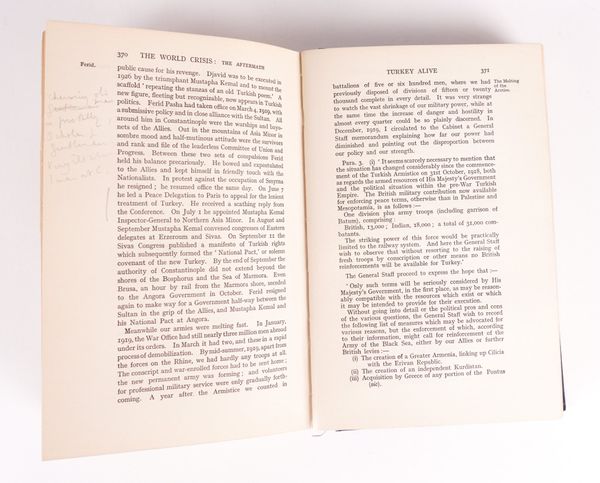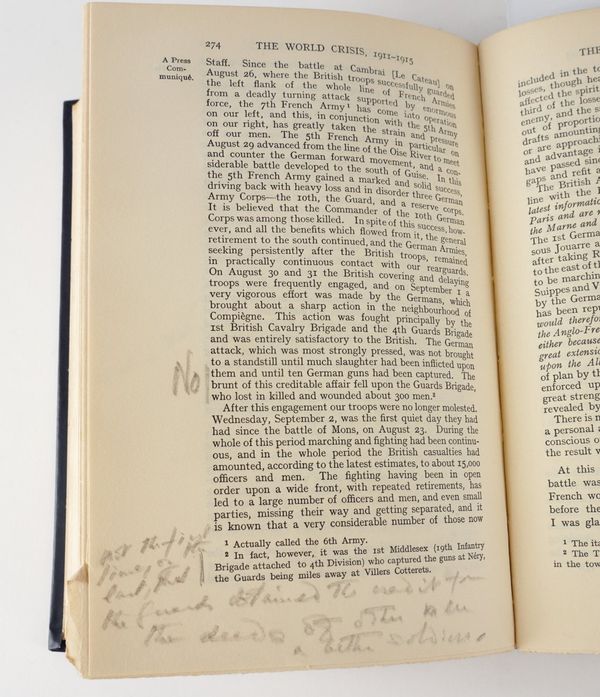CHURCHILL, Winston (1874-1965). The World Crisis, London, 1923-31, 6 vols., large 8vo, plates, original cloth. FIRST EDITION, VOLUMES ONE AND V ANNOTATED, HIGHLIGHTED AND WITH PASSAGES UNDERLINED IN PENCIL BY ANTHONY EDEN THROUGHOUT. (6)
| Estimate: | £700 - £1,000 |
| Hammer price: | £2,600 |
CHURCHILL, Winston Spencer (1874-1965). The World Crisis. London: Thornton Butterworth Limited, 1923-31. 5 parts bound in 6 [as usual], large 8vo (233 x 155mm). Half titles, plates and maps, some folding and printed in colours, errata or erratum slips before "Contents" and at p.339 in vol. one, at p.52 in vol. III and at the half title of vol. IV, tables (dedication leaf in vol. III torn without loss). Original dark blue cloth, the upper covers lettered in blind, the spines lettered in gilt (some very faint white staining, the spine of vol. V with some minor wrinkling, short closed tear to head of spine of vol. VI, extremities lightly rubbed, lacking dust jackets). Provenance: Anthony Eden, 1st Earl of Avon (old armorial bookplates in vols. one and V); Sir Gervase Beckett, Baronet (armorial bookplates in the other 4 vols. - Anthony Eden was one of Beckett's executors). FIRST EDITIONS, except for vol. V which is a second impression. In this set, of what is a notoriously complicated work bibliographically, the title pages read as follows: vol. one: "The World Crisis 1911-1914", dated on the verso of the title April 1923 [but with no volume asterisk on the spine]; vol. II: "The World Crisis 1915", undated, but the preface dated August 13, 1923; vol. III: "The World Crisis 1916-1918 Part I", dated on the verso of the title 1927; vol. IV: "The World Crisis 1916-1918 Part II", dated on the verso of the title 1927 [with pagination running on from the previous vol.]; vol. V: "The World Crisis. The Aftermath", dated on the verso of the title "First published ... March, 1929. Second impression March, 1929"; and vol. VI: "The World Crisis. The Eastern Front", dated on the verso of the title 1931. A HIGHLY IMPORTANT SET. VOLUMES ONE AND V ANNOTATED, HIGHLIGHTED AND WITH PASSAGES UNDERLINED IN PENCIL BY ANTHONY EDEN THROUGHOUT. For example, in volume one, on p.204 (commenting on the printed passage '... I am certain that if Sir Edward Grey had sent the kind of ultimatum suggested [i.e. that if Germany attacked France or Belgium, England would declare war upon her], the Cabinet would have broken up, and it is also my belief that up till Wednesday or Thursday at least, the House of Commons would have repudiated his action'), Eden writes: "In other words Cabinet was too 'soft'"; on p.265 (commenting on the printed passage 'At any rate, that is the sort of way in which I thought then, before the event, and think still, the French command might best have safeguarded the vital interests of France'): "This sounds [illegible words] much too vague ... I do not think Winston can [?]teach French generals this ... This friendship throughout the war was infinitely superior to ours and W. was not even a British soldier. Our staff - work was more thorough"; on p.266 (commenting on 'Plan XVII'): "This is neither true nor fair criticism"; on p.269 (commenting on the printed passage 'Someone suggested we should at any rate make sure of the Cotentin peninsula ... from which the British armies of the future might proceed to the rescue of France'): "You would have done better to do as you were told!"; on p.270 (commenting on a quote from Asquith's [?]telegram to the Commander-in-Chief Grand Fleet which stated on August 24th 1914, 'We have not entered the business [i.e. of going to war] without resolve to see it through and you may be assured that our action will be proportioned to the gravity of the need'): "Gas bag!"; on p.274 (commenting on the footnote 'In fact, however, it was the 1st Middlesex ... who captured the guns at Néry'): "Not the first time, or the last, that the Guards obtained the credit for the deeds of other and better soldiers"; on p.282 (commenting on the printed passage '... I consider now that this prudent withholding from the Army in the field in the face of every appeal and demand, the key-men who alone could make the new armies, was the greatest of the services which Lord Kitchener rendered to the nation at this time, and it was a service which no one of lesser authority than he could have performed'): "In other words we should not [underlined] have won the war without K. [i.e. Kitchener]"; in volume V, on p.23 (commenting, in blue pencil, on a passage which quotes Lloyd George, 'But after all, life is a brief span, and all that matters is not to fall below the level of events upon the greatest occasions'): "W's favourite motto"; on p.113 (commenting on the printed passage 'Mr Lloyd George said that "Great Britain would spend her last guinea to keep her navy superior to that of the United States or any other Power ..."'): "and today!"; on p.261 (commenting on refugees fleeing Crimea for Constantinople): "I saw this - indescribable. Selling stamps in the street, waiting in cafes, their uniforms were magnificent, their plight pitiable"; on p.287 (commenting on the printed passage 'A certain number of high Tories, while rigidly opposing any effective concession to Irish Nationalist demands, were still more violent in their denunciations of the Black and Tans'): "Bob C. as usual" [possibly referring to Robert Lindsay Crawford]; on p.290 a largely illegible note regarding a passage concerning Lloyd George's personal safety; on p.296 (commenting on Gladstone's views on Irish home rule): "[? illegible initials, but possibly] O.W.J. wanted a majority. He never thought of Home Rule until then - any more than [illegible name] did"; on p.307 (commenting on the printed passage 'Yet in so far as Mr Lloyd George can link his political misfortunes with this Irish story ...'): "not very far"; on p.320 Eden has boldly underlined and highlighted the following printed passage (tellingly, with hindsight): 'The general opinion was well expressed by Mr Neville Chamberlain:- "I, for one, am not going to be exasperated by outrages into changing my opinion as to the proper course to pursue. I consider in these difficult times that our business is to keep our heads, not to allow ourselves to be flustered into courses we may regret hereafter ..."'; on p.354 (commenting on the passage 'What was to happen to scandalous, crumbling, decrepit and penniless Turkey in this earthquake?'): "Hardly? It was our diplomacy and that of the French that failed. The Russians always aimed at [?]bringing Turkey into the war against us, for Constantinople was their chief war objective, as always"; on p.358 (commenting on the printed passage 'The rage and disappointment excited thereby throughout Turkey was said to have turned the scale and provoked Turkey into war against us'): "What effect had this on driving Turkey into the war against us? That it created profound feeling amongst all Turks who had [?]subscribed their [?]force, I know"; on p.359 (commenting on the printed passage 'I can recall no great sphere of policy about which the British Government was less completely informed than the Turkish'): "but the Russians knew it & bluffed us"; on p.369 (commenting on the printed passage 'I cannot understand to this day how the eminent statesmen in Paris ... could have been betrayed into so rash and fatal a step'): "Except that both Wilson & [?]L. G. [?Lloyd George] were [?]equally [?]ignorant & Clemenceau indifferent on most [?]aspects"; on p.370 (of Damat Ferid Pasha): "charming old man & probably scholar & gentleman. Very ill when I was at C"; on p.373 (commenting on the printed passage 'On the main issue of Constantinople Mr Lloyd George was whole-heartedly with lord Curzon'): "I thought dragging Curzon with him?"; on p.394 (commenting on a printed passage which transcribes a letter from Churchill to Lloyd George on Greece and Turkey): "All this would carry greater conviction [?]if [?]one [?]was not aware that Winston is perfectly capable of writing [the remainder of the annotation largely illegible]"; on p.395 (commenting on another printed transcribed letter from Churchill to Lloyd George): "Busy Bodies! Why not [illegible word] declaration of neutrality?"; on p.402 (commenting on a printed memorandum of Churchill's suggesting a possible blockade of Piræus): "More commitment & yet more!" Cohen A69.1; Woods A31(a). (6)
